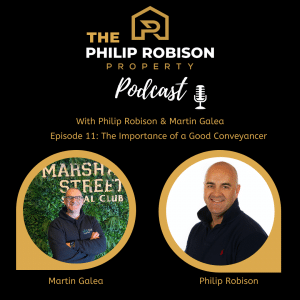 Tick Box Director and Licensed Conveyancer Martin Galea has appeared on the latest episode of the Philip Robison Property Podcast, discussing the role of conveyancers and Conveyancing in the Victorian property market.
Tick Box Director and Licensed Conveyancer Martin Galea has appeared on the latest episode of the Philip Robison Property Podcast, discussing the role of conveyancers and Conveyancing in the Victorian property market.
In a wide-ranging discussion with host and property expert Philip Robison, Martin fielded several questions about property conveyancing services, what conveyancers in Melbourne do in their day-to-day role, as well as sharing his wide range of experiences picked up over his 30+ years as a practising conveyancer.
Read on for some of the highlights from the discussion, and check out the full episode below.
What is the key difference between a conveyancer and a solicitor?
“A conveyancer is someone specifically trained and qualified to handle the transfer of real estate from one person to another.
“They can give professional legal advice on title transfers and conduct official legal work to ensure your purchase or sale runs smoothly.
“A solicitor is a more general legal practitioner but one with a specialisation to conduct your Conveyancing. They hold a practising certificate for law and also have the specialist knowledge required to handle the transaction of a property.”
Why would you pick one over the other?
“As a rule of thumb, all conveyancers are qualified to handle your affairs, while only some solicitors will have the property training in so far as actual experience is concerned to conduct your conveyancer,” Martin said.
“Which should you use is a common question, but a conveyancer is someone who is licensed specifically to handle these transactions without being a qualified lawyer, and a solicitor is a licensed legal professional and maybe qualified to handle title transfers.
“You can take your pick as long as they have a current qualification and license and they can handle your sale or purchase with minimum fuss.
“The major differences are that a solicitor may provide more general property advice. However, this can come at a premium.
“A conveyancer won’t be conducting other legal work and therefore should be more affordable.
“It depends on your legal needs.”
What separates a good conveyancer from an excellent conveyancer?
“A good conveyancer knows how to do the tasks needed to commence and complete a transaction,” Martin said.
“But I think an excellent conveyancer knows why he/she does what he/she does and how we do those tasks needed to commence and complete a transaction.
“There is a distinct difference between a conveyancer who has excellent knowledge of the law, both statute and common law, and great drafting skills when preparing documentation and negotiating terms such as the addition or deletion of special conditions that better protect their client.
“The keys to identifying an excellent conveyancer is identifying experience, knowledge and references.”
There is plenty of knowledge and value on offer in the rest of the discussion, as host, Philip Robison leads a discussion that covers a wide range of other questions such as:
- Martin shares examples of how a good conveyancer can save you big time – Ever heard of the Apparent Purchasers Exemption? This one saved a client $25,000 in Government Stamp Duty.
- Is the work of a Conveyancer State-based? Can you practice interstate or for matters cross border would you need to refer that work to another Conveyancer?
- Do conveyancers work on only Residential Matters or can they do work on Commercial matters as well?
- What are some of the different types of matters as a Conveyancer you act on? We spoke offline about Concessions, Subdivisions and Partitions? Martin provides examples of Case Studies.
- So, when a matter goes off the rails, what then? Do you engage and lawyer, and if so, when?
- Martin explains what PEXA is and its importance in the world of Covid-19 and how this enables settlements to be effected while maintaining Social Distancing.
- Martin shares his thoughts on being on the State Revenue Office Consultative Council, representing Victorian conveyancers.
- Martin talks about what he sees as the future of Conveyancing from the Consumer’s Point of view. Are there any significant changes that we should look out for in the property landscape?
Listen to the full podcast below.
Subscribe to the Phil Robison Property Podcast HERE.

Recent Comments